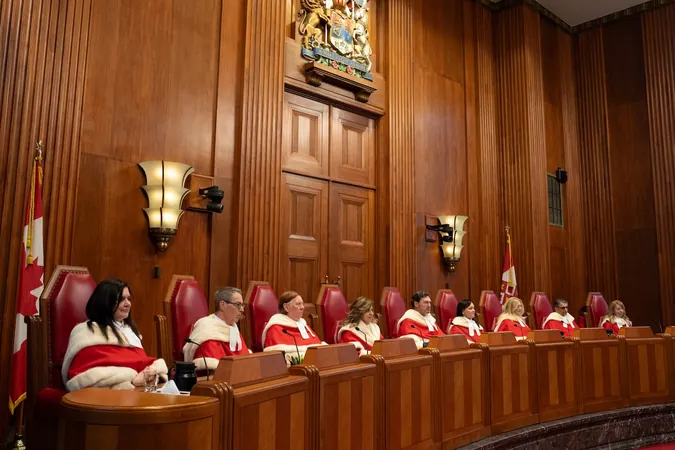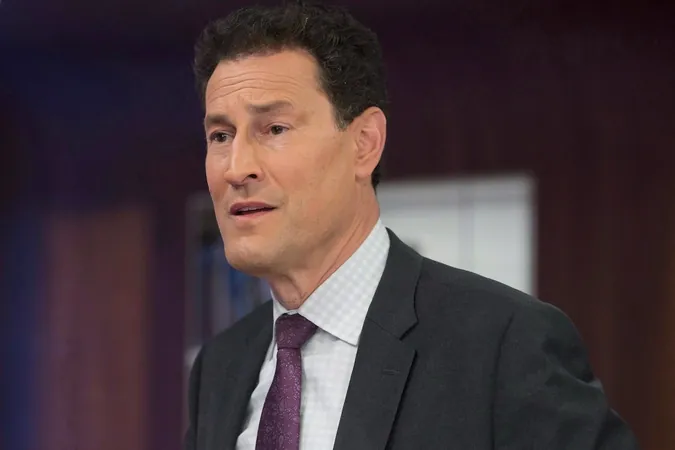
Conservatives Vow to Revamp Judiciary with Tougher Judges in Election Push
2025-04-12
Author: Olivia
A Bold Move Towards Tougher Sentencing
In a decisive strategy for the upcoming federal election, Canada's Conservative Party is promising to appoint judges who will impose stricter sentencing on criminals. This marks a significant ideological shift in how judicial appointments could influence law and order policies in the country.
Poilievre’s Tough-on-Crime Agenda
At the forefront of Conservative Leader Pierre Poilievre's campaign is a commitment to implement what he claims will be "the largest crackdown on crime in Canadian history." This vision extends right into the heart of the judiciary.
Putting Victims First
Conservative spokesperson Sam Lilly stated, "We will appoint judges who prioritize the victims of crime and ensure that dangerous criminals are kept behind bars." This pledge suggests a courtroom dynamic that places harsher penalties as a core priority.
Lasting Influence of Judicial Appointments
The power to appoint judges allows a governing party to leave a long-lasting mark on the judiciary, continuing to shape legal outcomes well after they are out of power. Appointments include influential roles on the Supreme Court and provincial courts, where decisions can have profound implications for law interpretation.
Judicial Landscape Under Scrutiny
Currently, the Liberal Party holds a majority in federal judicial appointments, with 53% of judges being appointed since they took office in 2015. This gradual transformation showcases how parties can subtly shift the judiciary’s balance over time.
Historical Precedents and Future Outlook
Poilievre's strategy draws comparisons to former Prime Minister Stephen Harper's approach, as both leaders advocate for appointing judges aligned with stricter crime policies. Legal experts acknowledge that while political influence exists, judges often display independence in their rulings.
What Do the Other Parties Say?
When inquired about their judicial policies, the Liberals expressed a focus on eliminating judicial vacancies, noting their recent success in reducing them to an all-time low of 1.5%.
A Cautious Approach to Political Labeling
Unlike in the U.S., the Canadian judiciary tends to maintain a non-partisan facade. Many in the legal community are wary of labeling judges based on their political appointments, fearing such labels could undermine the integrity of the judicial system.
Diversity in Judicial Appointments
Under Justin Trudeau, initiatives have been made to increase diversity among appointed judges, a stark contrast to previous years when Indigenous representation was minimal amongst judges appointed before 2016.
Creating a New Judicial Legacy
Trudeau also reformed the Supreme Court appointment process, introducing greater scrutiny and transparency. This has opened the door for a broader range of candidates but raised concerns over whether this approach will continue to attract top legal talents.
Looking Ahead: A Possible Turnover in the Supreme Court
With notable retirements expected in the coming years, the judiciary landscape may undergo significant changes. The next scheduled retirement at the Supreme Court is in 2028, potentially paving the way for a new ideological shift depending on the party in power.
The Ongoing Judicial Tug-of-War
As we head toward the election, anticipate a heated debate over the future of Canada's judiciary. Will the Conservative push for stricter judges prevail, or will the Liberals maintain their progressive judicial appointments? Only time will tell.









 Brasil (PT)
Brasil (PT)
 Canada (EN)
Canada (EN)
 Chile (ES)
Chile (ES)
 Česko (CS)
Česko (CS)
 대한민국 (KO)
대한민국 (KO)
 España (ES)
España (ES)
 France (FR)
France (FR)
 Hong Kong (EN)
Hong Kong (EN)
 Italia (IT)
Italia (IT)
 日本 (JA)
日本 (JA)
 Magyarország (HU)
Magyarország (HU)
 Norge (NO)
Norge (NO)
 Polska (PL)
Polska (PL)
 Schweiz (DE)
Schweiz (DE)
 Singapore (EN)
Singapore (EN)
 Sverige (SV)
Sverige (SV)
 Suomi (FI)
Suomi (FI)
 Türkiye (TR)
Türkiye (TR)
 الإمارات العربية المتحدة (AR)
الإمارات العربية المتحدة (AR)